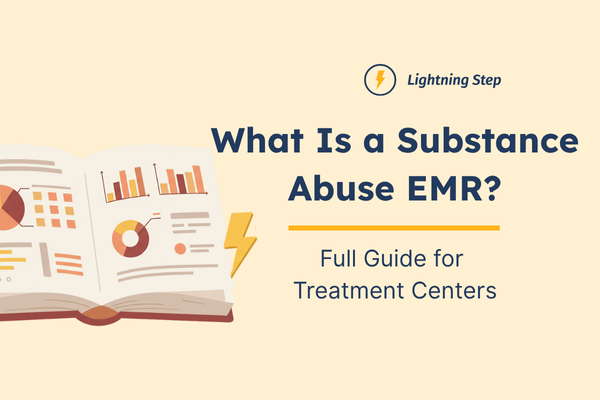
Treatment centers across the country struggle with fragmented systems, compliance headaches, and endless paperwork that pulls staff away from patient care. This administrative burden costs facilities valuable time and resources that could be directed toward helping patients recover.
The substance abuse EMR software market was valued at USD 2.3 billion in 2023 and is projected to reach USD 4.1 billion by 2031, growing at a CAGR of 8.1%. This growth reflects the increasing recognition that specialized technology is essential for modern addiction treatment.
A substance abuse EMR is a specialized electronic medical record system designed specifically for addiction treatment facilities. Unlike general medical EMRs, these systems include features tailored to the unique needs of substance use disorder treatment.
The key difference lies in compliance requirements. 42 CFR Part 2 regulations impose strict restrictions on substance use disorder patient records that go beyond standard HIPAA protections. These records cannot be used to investigate or prosecute patients without written consent or a court order. Since February 2024, programs may use a single patient consent for all future TPO disclosures until revoked in writing.
These systems must also meet HIPAA requirements for electronic protected health information, creating a dual layer of privacy protection for patients seeking addiction treatment.
Modern substance abuse EMR systems like LightningStep's platform address these requirements while providing comprehensive tools for clinical documentation, treatment planning, and regulatory compliance.
Effective substance abuse EMRs include specialized assessment tools that capture addiction-specific data points. These systems support comprehensive intake processes that document substance use history, withdrawal symptoms, and co-occurring mental health conditions.
Treatment planning modules allow clinicians to create individualized recovery plans with measurable goals. The software tracks progress through various treatment phases, from detoxification to long-term recovery support.
Automated consent workflows let centers track, renew and revoke patient permissions per SAMHSA guidelines. This feature streamlines compliance while protecting patient privacy rights.
Automated reporting features generate compliance documentation for accrediting bodies like CARF and The Joint Commission. These tools organize evidence of compliance, including clinical chart reviews and outcome measurements, in one centralized location.
Unified CRM and RCM integration with single-login access to admissions dashboards, referral management, billing, and revenue cycle workflows eliminates duplicate data entry and reduces administrative overhead.
Workflow templates standardize documentation for common procedures like group therapy sessions and individual counseling notes. These templates link single notes to multiple patient records when appropriate, saving time during group sessions.
Care coordinators, therapists, and medical staff can access current patient information simultaneously, improving communication and care coordination.
Role-based permissions protect sensitive data while allowing appropriate access. Different staff members see only the information relevant to their role, maintaining privacy while supporting collaborative care.
LightningStep's platform includes automated reminders for medication schedules and appointment follow-ups. E-signature capabilities streamline consent processes, while mobile access allows staff to update records from any location.
Digital records improve accuracy by eliminating handwriting interpretation issues and reducing data entry errors. Automated alerts flag potential drug interactions or missing assessments before they become problems.
Compliance becomes manageable with built-in audit trails and automated reporting. Centers can demonstrate regulatory adherence without manual document compilation.
Care continuity improves through integrated referral management and diagnostic tools. When patients transfer between levels of care, their complete treatment history follows them seamlessly.
Patient engagement increases through portal access to treatment plans and educational resources. Patients can track their own progress and communicate with providers between appointments.
Electronic health record systems have been shown to be associated with improvements in care processes, quality of care, and patient outcomes, as shown in a PMC study.
LightningStep offers customizable workflows designed specifically for substance abuse treatment providers. The platform adapts to different treatment modalities, from outpatient counseling to residential programs.
Advanced reporting dashboards provide operational insights while maintaining regulatory compliance. Administrators can track key performance indicators like patient retention rates and treatment completion statistics.
Built-in telehealth and e-prescribing features provide unified workflow management, allowing providers to conduct virtual sessions and manage medications within the same platform they use for documentation.
The platform's AI assistant, LIA, helps clinicians save over 12.5 hours monthly on documentation tasks. This ISO 42001 certified AI technology reduces administrative burden while maintaining accuracy and compliance.
Start with a thorough needs assessment. Document current workflows for intake, treatment planning, medication management, and billing before selecting a vendor. This analysis helps identify specific requirements and potential challenges.
Implementation success depends on comprehensive staff training:
Data migration requires careful planning and execution. Work with your vendor to map existing data fields to the new system and validate accuracy throughout the transfer process.
LightningStep provides dedicated onboarding services to ensure smooth implementation. Their team works with centers to configure workflows, train staff, and optimize system performance from day one.
AI-powered analytics will transform treatment planning. Predictive algorithms will identify patients at high risk for relapse and suggest intervention strategies before crises occur, powered by AI and machine learning algorithms.
AI-enabled telehealth integration will enhance remote recovery support and patient engagement, transforming healthcare delivery through measurable improvements in patient outcomes and operational efficiency.
Interoperability will advance through FHIR standards and API integrations, enabling seamless data exchange between EMR systems, health information exchanges, and specialty care providers. This connectivity creates comprehensive patient records that follow individuals throughout their recovery journey.
LightningStep continues evolving to meet these next-generation demands. The platform's cloud-based architecture supports seamless data integration while maintaining the security and compliance standards that addiction treatment centers require.
Specialized substance abuse EMR systems deliver regulatory compliance, operational efficiency, and improved patient outcomes in one integrated platform. Ready to streamline your workflows and focus more time on patient care? Contact LightningStep today and discover how our AI-powered platform transforms addiction treatment operations.



